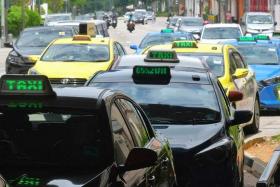CNG, petrol and diesel cars - all can explode if there's a leak and fire
It doesn't matter whether a vehicle uses compressed natural gas (CNG) or liquid fuel such as petrol and diesel.
If there is a leak and a fire, there is a high chance of the vehicle exploding, said Professor Foo Swee Cheng from the Department of Chemical and Biomolecular Engineering at the National University of Singapore.
CNG vehicles were thrust into the limelight when a Trans-Cab taxi that ran on CNG and petrol exploded on Sunday after an accident in Commonwealth Avenue, injuring four people.
Prof Foo said the explosion could have been caused by a leak in the CNG tank.
Mr Siew Yong Pau, a chemical engineering lecturer at Temasek Polytechnic's School of Applied Science, said that despite the strength of the tank, there is no guarantee the gas would not leak.
NUMBERS
The Land Transport Authority (LTA) told The New Paper that of the 26,000 taxis registered with it, there are about 1,000 petrol-CNG units as of March.
It said there are 1,660 cars out of the 602,500 registered here that use petrol-CNG.
The LTA said no cars and taxis operate solely on CNG.
Of the more than 18,000 buses here, only 12 SBS Transit buses use CNG.
The company's website said it introduced the 12 buses in 2002. Another two buses operate on petrol-CNG.
SMRT's website says its Hyundai Azera taxi runs on CNG.
CNG-petrol car owners TNP spoke to at Smart Energy's CNG refuelling station in Serangoon on Wednesday morning said they were not worried.
Housewife Karina Mak, 43, said: "It was not confirmed that the accident was due to the CNG tank. I get my tank inspected at least every year."
She had bought her Toyota Allion in 2008 due to the attractive tax rebates.
But the tank takes up space in the boot, and the price of CNG gas has increased.
A full tank of CNG used to cost her less than $18 in 2008, but it now costs $27.
She added that her certificate of entitlement will expire next year, and she does not intend to buy another CNG car as it is not economical.
Trans-Cab driver Robin Tan, 42, said: "That was just one case, and I take my taxi for inspection every half a year, so I am not worried about my taxi exploding."
A Trans-Cab spokesman told The Straits Times that investigations into the explosion were ongoing, and it was checking its fleet of CNG taxis.
A spokesman for Esteem Performance, an LTA-approved CNG system supplier, told TNP the company started providing CNG tank installation services in around 2007 but stopped in 2009.
He said: "Demand decreased due to lower oil prices, the increasing cost of CNG gas and the lack of CNG refuelling stations."
Managing director of UK Cool, Mr Alvin Tok, said they stopped installing CNG tanks in 2011.
"CNG tanks in cars are usually safe, but customers should engage qualified CNG inspectors to do yearly checks on their tanks three years after installation," he said.
Get The New Paper on your phone with the free TNP app. Download from the Apple App Store or Google Play Store now


